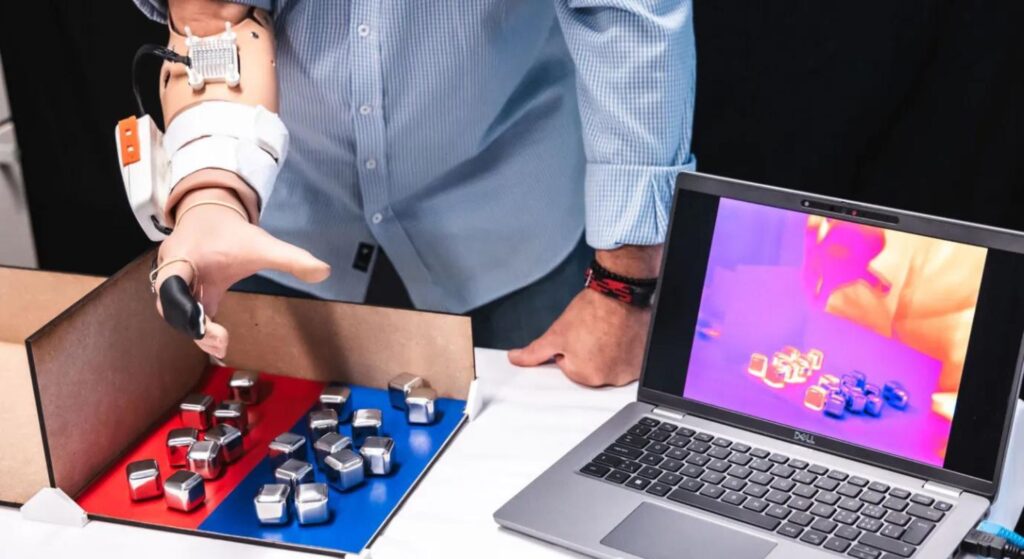Social encounters are made more humane by the warmth of another person, whether it be through a simple handshake or a full-body hug. Now, researchers have developed a prosthetic system that enables amputees to feel similar natural temperature sensations.
A group of researchers in Italy and Switzerland invented a device called MiniTouch, which can give amputees the ability to sense and react to temperature, which its developers believe will strengthen their human connections.
To test, Researchers reported in Med on February 9 that Fabrizio, a 57-year-old man who has had an above-the-wrist amputation for 37 years, was able to identify cold, cool, and hot bottles of liquid with absolute precision, distinguish between plastic, glass, and copper far better, and sort steel blocks by temperature with about 75 percent accuracy after the device was attached to his prosthetic hand.
The instrument also made it easier for Fabrizio to differentiate between touching a human or robotic arm, even when blindfolded. When the MiniTouch was on, his accuracy was 80 percent, and just 60 percent when turned off.
“When I had my accident when I was 20 years old, I tried a prosthetic hand that gave me a simple movement. Instead, with these new technologies, I can understand better what I am touching,” Fabrizio said.
The sensor alerted a temperature controller when it sensed a temperature shift from its baseline of 32C. This sent the data to an additional section that was affixed to the upper area of the prosthesis and made contact with the arm’s skin. Moreover, the temperature that the sensor had registered was subsequently replicated on the arm at the spot where the phantom feelings were triggered. The gadget was used to replicate temperatures ranging from 20C to 40C in the current investigation. In summary, the subject felt heat where the temperature sensor should have been in their missing hand.
According to the scientists, this new technique represents one of the final opportunities to restore sensation to robotic hands—the first instance of genuine temperature sensations being integrated into a working mechanical limb.
Furthermore, augmenting sensory feedback from a prosthesis may assist individuals feel as though an artificial limb is an integral part of their body, according to Prof. Solaiman Shokur, a senior author of the study from the Swiss Federal Institute of Technology Lausanne. “You cannot give a natural sensation without temperature,” he stated.
Shokur also noted that the method may also assist individuals with prosthetic limbs in deciphering between various materials and determining if an object is dangerously hot.
Another senior author of the paper, Prof. Silvestro Micera of the Sant’Anna School of Advanced Studies in Italy and the Swiss Federal Institute of Technology Lausanne stated that the team’s current goal is to develop a single wearable system that would enable prosthetic users to feel a variety of sensations, such as pressure, position, temperature, texture, and wetness.
On the other hand, Dr. Sigrid Dupan, a specialist in sensory feedback for prostheses at University College Dublin, said the fully integrated system represents a significant advancement in the study of temperature feedback for artificial limbs and has the potential to make individuals feel as though their prostheses were an integral part of their body. However, she cautioned that earlier research had demonstrated that not all amputees could experience temperature sensations and that some were not consistently affected.
“I’m excited about the research, and it shows promising developments, but people can’t expect the implementation of these new devices into our healthcare system in a short timeframe,” she said.
Although the authors recommend testing the device on a broader patient population, they also point out that the MiniTouch is a very affordable device that can be quickly customized and attached to current prostheses since it is built on widely accessible electronics and does not require surgery.
Other POP! stories you might like:
Japanese scientists develop muscle tissue-powered, two-legged robot
You’re not imagining it: January always feels like it runs forever. Here’s why
11-year-old deaf boy hears for the first time after undergoing gene treatment


